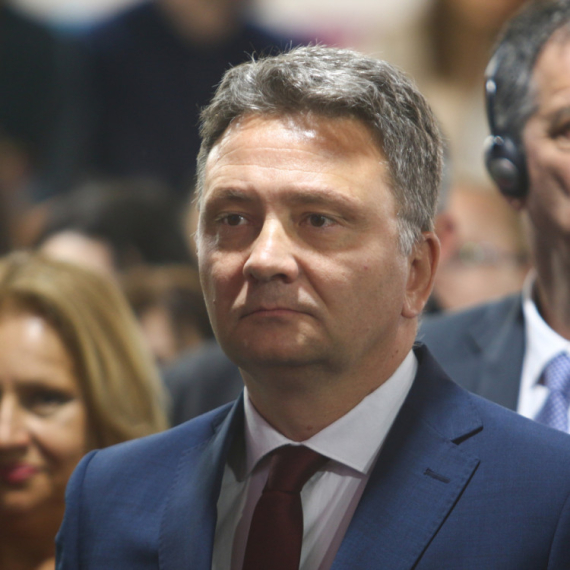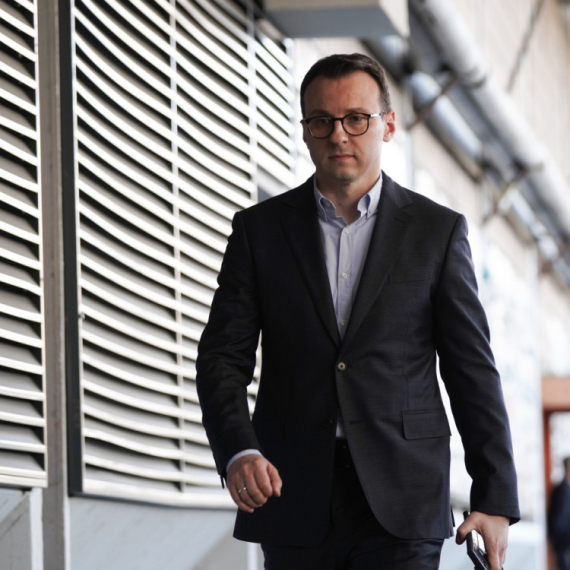Envoy talks organ trafficking; Prosecutor criticizes Nikolić
The Serbian ambassador to the UN has asked the Security Council to ensure a professional, unbiased and efficient investigation into Kosovo organ trafficking.
Thursday, 07.06.2012.
21:00

The Serbian ambassador to the UN has asked the Security Council to ensure a professional, unbiased and efficient investigation into Kosovo organ trafficking. Feodor Starcevic addressed the council on Thursday in New York to say that Belgrade had expressed concern on multiple occasions because of a lack of transparency in the investigation conducted by EULEX, the EU mission in the province. Envoy talks organ trafficking; Prosecutor criticizes Nikolic Speaking at a session where International Criminal Tribunal for the former Yugoslavia (Hague Tribunal) President Theodor Meron and Chief Prosecutor Serge Brammertz presented their reports on cooperation with the court, Starcevic pointed out that Serbia's cooperation with the Hague gave it the moral right to request that Council of Europe rapporteur Dick Marty's claims about organ trafficking in Kosovo be fully investigated. The Marty report, published in late 2010, named members of the ethnic Albanian KLA as perpetrators of crimes that included kidnappings and illegal imprisonment of Serb and other civilians in Kosovo, and removal of their body parts in prisons in northern Albania, with the goal of selling the organs in the international black market. "All of the fugitives who were believed to be hiding from the Hague in Serbia have been arrested and turned over to the Hague and there are no more fugitives," Starcevic noted, drawing attention to the fact that Brammertz had stated Serbia's cooperation had been impeccable for years when it comes to providing access to archives and witnesses. Commenting on Brammertz's remarks that the investigation of the helpers of Ratko Mladic and Goran Hadzic was late, the ambassador said the issue was outside of the Hague's jurisdiction, but that the authorities in Belgrade were aware of its gravity and had shared information on the investigation and would continue to so. Serbia and other countries have changed since 1993, when the Hague was founded and its convicted were supposed to serve their sentences outside the territory of the former Yugoslavia, Starcevic stated, asking the Security Council to consider getting Serbia involved in implementing those sentences. Serbia has helped administer international justice, continues to work with the Hague and is prepared for the responsibility in implementing those sentences, meaning making sure the convicted served out their sentences, Starcevic concluded, adding he believed the other countries of the former Yugoslavia thought the same. (FoNet, file) "Nikolic's statements unacceptable" Chief Prosecutor of the International Criminal Tribunal for the former Yugoslavia Serge Brammertz has said that recent statements by Serbian President Tomislav Nikolic denying that genocide occurred in Srebrenica in July 1995 were unacceptable. Presenting his regular report to the UN Security Council, Brammertz stated that Nikolic's remarks were in contrast to the legal and factual findings by the Hague and International Court of Justice. Such rhetoric is a step backwards, aggravates the victims' suffering and threatens the fragile process of reconciliation in the former Yugoslavia, he noted. The Hague's cooperation with the countries of the former Yugoslavia is mostly satisfactory, except for the investigation regarding the network of Ratko Mladic's and Goran Hadzic's aides in Serbia and tardiness of war crimes investigations in Bosnia-Herzegovina, Brammertz pointed out. The Hague still expects answers on how Mladic and Hadzic were able to evade justice for so long and whether government officials were involved, he said. Tanjug
Envoy talks organ trafficking; Prosecutor criticizes Nikolić
Speaking at a session where International Criminal Tribunal for the former Yugoslavia (Hague Tribunal) President Theodor Meron and Chief Prosecutor Serge Brammertz presented their reports on cooperation with the court, Starčević pointed out that Serbia's cooperation with the Hague gave it the moral right to request that Council of Europe rapporteur Dick Marty's claims about organ trafficking in Kosovo be fully investigated.The Marty report, published in late 2010, named members of the ethnic Albanian KLA as perpetrators of crimes that included kidnappings and illegal imprisonment of Serb and other civilians in Kosovo, and removal of their body parts in prisons in northern Albania, with the goal of selling the organs in the international black market.
"All of the fugitives who were believed to be hiding from the Hague in Serbia have been arrested and turned over to the Hague and there are no more fugitives," Starčević noted, drawing attention to the fact that Brammertz had stated Serbia's cooperation had been impeccable for years when it comes to providing access to archives and witnesses.
Commenting on Brammertz's remarks that the investigation of the helpers of Ratko Mladić and Goran Hadžić was late, the ambassador said the issue was outside of the Hague's jurisdiction, but that the authorities in Belgrade were aware of its gravity and had shared information on the investigation and would continue to so.
Serbia and other countries have changed since 1993, when the Hague was founded and its convicted were supposed to serve their sentences outside the territory of the former Yugoslavia, Starčević stated, asking the Security Council to consider getting Serbia involved in implementing those sentences.
Serbia has helped administer international justice, continues to work with the Hague and is prepared for the responsibility in implementing those sentences, meaning making sure the convicted served out their sentences, Starčević concluded, adding he believed the other countries of the former Yugoslavia thought the same.
"Nikolić's statements unacceptable"
Chief Prosecutor of the International Criminal Tribunal for the former Yugoslavia Serge Brammertz has said that recent statements by Serbian President Tomislav Nikolić denying that genocide occurred in Srebrenica in July 1995 were unacceptable.Presenting his regular report to the UN Security Council, Brammertz stated that Nikolić's remarks were in contrast to the legal and factual findings by the Hague and International Court of Justice.
Such rhetoric is a step backwards, aggravates the victims' suffering and threatens the fragile process of reconciliation in the former Yugoslavia, he noted.
The Hague's cooperation with the countries of the former Yugoslavia is mostly satisfactory, except for the investigation regarding the network of Ratko Mladić's and Goran Hadžić's aides in Serbia and tardiness of war crimes investigations in Bosnia-Herzegovina, Brammertz pointed out.
The Hague still expects answers on how Mladić and Hadžić were able to evade justice for so long and whether government officials were involved, he said.



































Komentari 6
Pogledaj komentare